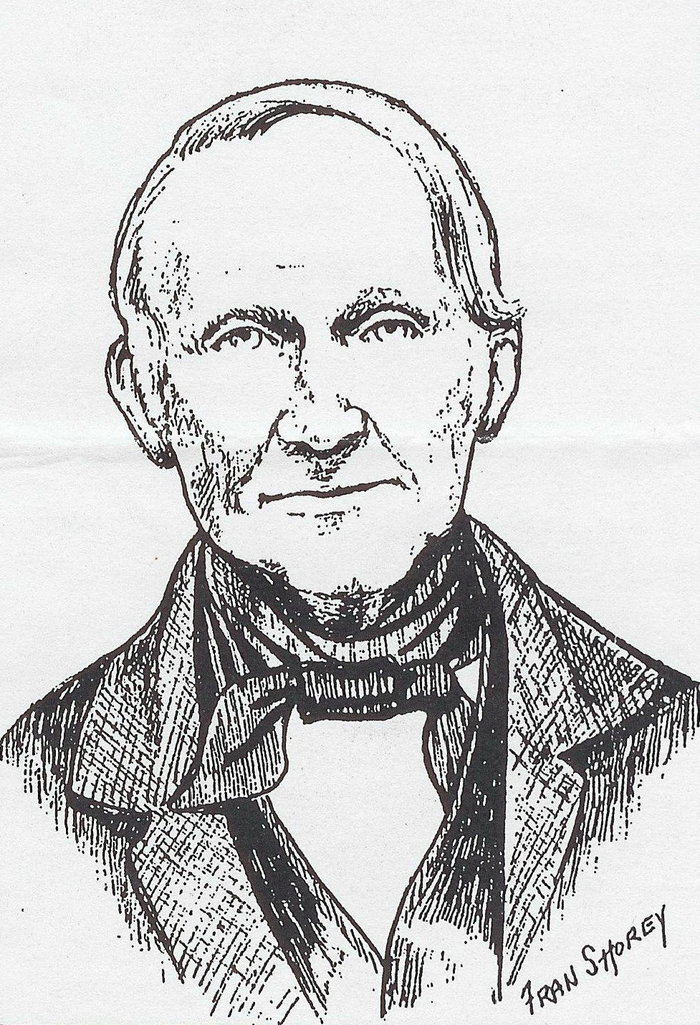The man we honor today played a part in a little known action during the War of 1812. After the dreadful damage done at Hampden, Bangor and Frankfort in September 1814, "From the violent manner in which the enemy had seized upon the Penobscot, there were strong apprehensions that he designed to extend his conquests to the banks of the Kennebec. The people in the seaports especially were much alarmed and Major General King of Bath issued orders for the whole of his division to appear in arms at Wiscasset and other places of his appointment. A part of General Sewell's division was also put in requisition and Wiscasset, the place of general rendezvous, was presently filled with soldiery... Several sails were seen, September tenth and eleventh, off Pemaquid and one party actually landed at Camden and another at Northport. The militia forces were continued in arms and Wiscasset was an encampment till it was known that most of the fleet had proceeded east from Castine." (Williamson, History of the State of Maine, 1832)
Kingsbury's Illustrated History of Kennebec County Maine . 1625 -1892 refers to him as "Colonel Robert Fletcher, who came to China about 1807..." and the Burrill, History of the Central Lodge. No. 45 China. Maine suggests his arrival in 1810. At any rate, by 1814 he was the captain in command of a company of fifty men attached to Lt. Col. Moore's regiment and by 1820 was a Lt. Col. himself and in 1821 succeeded Col. Nathan Stanley as full colonel in the Third Regiment of the Maine Militia. Meanwhile, Robert Fletcher was active in the community, serving as a selectman for Harlem in 1815 or 1816 and for China in 1818 or 1819. In that role he was a surveyor of highways, fence viewer, field driver and hogreeve (hogreeve is "an officer charged with the prevention or appraising of damages by stray swine. Formerly a town officer in New England.") In 1823 he was a member of a committee to "superintend the building of the bridge at the head of the pond" and in 1841 he was part of a committee to look into the purchase of a town poor farm and served on the Methodist church building committee. Fletcher was also the first junior warden when the Central Lodge No. 45 of the Masonic order was organized. He was described as a trader and farmer and established the second village store in China, the one whose floor gave way under an immense stock of rum, which crashed to the cellar below. His sons carried on in local business and community affairs and the Fletcher name is still prominent in China.
The man we honor today played a part in a little known action during the War of 1812. After the dreadful damage done at Hampden, Bangor and Frankfort in September 1814, "From the violent manner in which the enemy had seized upon the Penobscot, there were strong apprehensions that he designed to extend his conquests to the banks of the Kennebec. The people in the seaports especially were much alarmed and Major General King of Bath issued orders for the whole of his division to appear in arms at Wiscasset and other places of his appointment. A part of General Sewell's division was also put in requisition and Wiscasset, the place of general rendezvous, was presently filled with soldiery... Several sails were seen, September tenth and eleventh, off Pemaquid and one party actually landed at Camden and another at Northport. The militia forces were continued in arms and Wiscasset was an encampment till it was known that most of the fleet had proceeded east from Castine." (Williamson, History of the State of Maine, 1832)
Kingsbury's Illustrated History of Kennebec County Maine . 1625 -1892 refers to him as "Colonel Robert Fletcher, who came to China about 1807..." and the Burrill, History of the Central Lodge. No. 45 China. Maine suggests his arrival in 1810. At any rate, by 1814 he was the captain in command of a company of fifty men attached to Lt. Col. Moore's regiment and by 1820 was a Lt. Col. himself and in 1821 succeeded Col. Nathan Stanley as full colonel in the Third Regiment of the Maine Militia. Meanwhile, Robert Fletcher was active in the community, serving as a selectman for Harlem in 1815 or 1816 and for China in 1818 or 1819. In that role he was a surveyor of highways, fence viewer, field driver and hogreeve (hogreeve is "an officer charged with the prevention or appraising of damages by stray swine. Formerly a town officer in New England.") In 1823 he was a member of a committee to "superintend the building of the bridge at the head of the pond" and in 1841 he was part of a committee to look into the purchase of a town poor farm and served on the Methodist church building committee. Fletcher was also the first junior warden when the Central Lodge No. 45 of the Masonic order was organized. He was described as a trader and farmer and established the second village store in China, the one whose floor gave way under an immense stock of rum, which crashed to the cellar below. His sons carried on in local business and community affairs and the Fletcher name is still prominent in China.
Family Members
-
![]()
Sarah "Sally" Fletcher Russ
1806–1858
-
![]()
Dr Franklin Parker Fletcher
1808–1896
-
![]()
Mary Ann Fletcher Russ
1810–1900
-
![]()
Julia E. Fletcher
1813–1833
-
![]()
Sophia Fletcher Maxwell
1814–1853
-
![]()
Capt Alfred A. Fletcher
1817–1868
-
![]()
Elizabeth S. Fletcher Giddings
1821–1872
-
![]()
Sgt Abisha Benson Fletcher
1822–1906
-
![]()
Susan Fletcher Weeks
1828–1881
Advertisement
Records on Ancestry
Advertisement

















